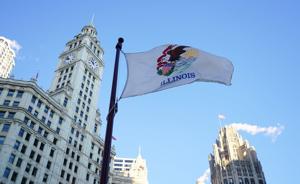(The Center Square) – A new Tax Foundation study finds Illinois with the second highest corporate tax rate in the country. Some say that signals more struggles ahead for the Land of Lincoln.
The nonpartisan Tax Foundation ranked states by their corporate income tax rates as of Jan. 1, 2024. Six states, Texas, Nevada, Washington, Wyoming, South Dakota and Ohio, do not levy a corporate income tax. Of the 44 that do, Illinois’ 9.5% rate put the state at No. 2, up from No. 3 in last year’s report. The top spot in 2024 goes to Minnesota at 9.8%. The state with the lowest rate outside of the states that do not have such taxes is North Carolina at 2.5%.
Wirepoints President Ted Dabrowski fears the report only signals more trouble for the Land of Lincoln.
“It’s bad for Illinois companies, it’s bad for Illinois’ economy and it’s bad for Illinois residents because the more expensive it continues to get for companies in Illinois, the fewer jobs it’ll create here,” Dabrowski told The Center Square. “It’s an economy that’s lagging behind most of the country.”
The new state-by-state rankings also highlight that Illinois’ flat corporate income tax rate of 9.5% is four percentage points higher than the flat 5.5% rate now in place in neighboring Iowa.
In Illinois, Dabrowski said he fears things could get worse before they get better.
“This leadership doesn’t care,” he said. “In fact, they like it this way because they want more money to fund the initiatives they have. They didn’t seem to be very concerned when Boeing left or Caterpillar or Citadel. If they did, you would see them do something about lowering spending and lowering rates, but instead they continue to increase spending and they have no problem with rates being this high.”
Dabrowski said the state’s tax rates are a big reason why Illinois has seen more than 200,000 residents make the decision to leave over just the last three years.
“If you don’t have a change in leadership in government, if you continue to have the same people in charge, then we’ll continue to see people leave Illinois,” he said. “You’ll have businesses leave Illinois, you’ll have people leave and it’ll be a tougher and tougher place and a poorer and poorer state until it doesn’t work anymore.”







